HI5015: Legal Aspects of Banco Santander's International Business
VerifiedAdded on 2024/07/22
|10
|2519
|382
Report
AI Summary
This report provides a comprehensive analysis of the legal aspects of Banco Santander's international business and enterprise. It examines the various laws and legislation, including the Corporation Act 2001, Competition and Consumer Act 2010, Banking Act 1959, and Reserve Bank Act 1959, that govern the bank's operations in Australia and globally. The report also discusses the importance of treaties, agreements, and conventions in facilitating international business, with specific reference to agreements like ChAFTA. It highlights how compliance with these legal frameworks is crucial for the stability, efficiency, and ethical conduct of Banco Santander's international operations. The analysis showcases the bank's expansion strategies, regulatory adherence, and collaborative agreements, emphasizing the significance of legal considerations in its global success. Desklib provides access to similar solved assignments and past papers for students.
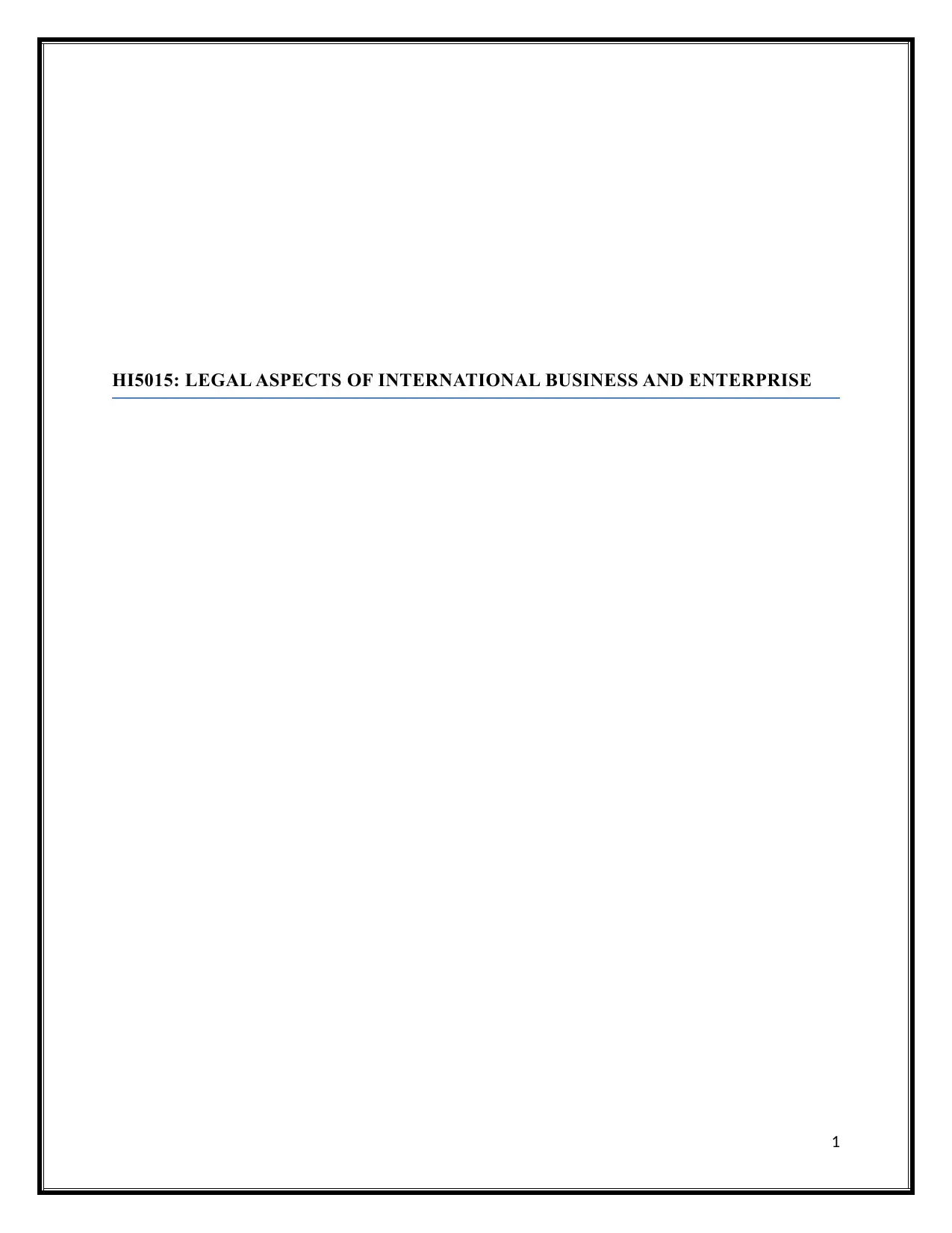
HI5015: LEGAL ASPECTS OF INTERNATIONAL BUSINESS AND ENTERPRISE
1
1
Paraphrase This Document
Need a fresh take? Get an instant paraphrase of this document with our AI Paraphraser
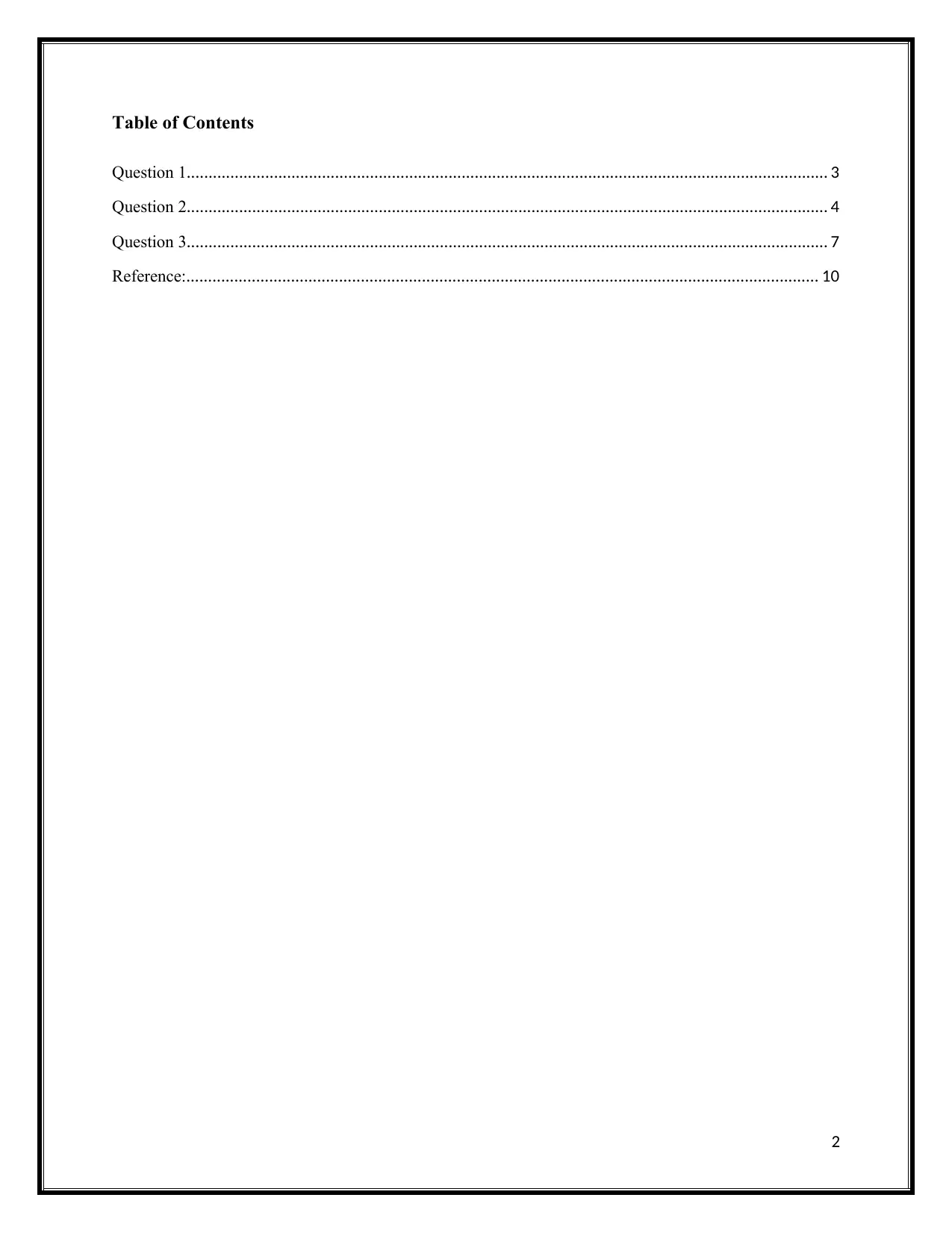
Table of Contents
Question 1................................................................................................................................................... 3
Question 2................................................................................................................................................... 4
Question 3................................................................................................................................................... 7
Reference:................................................................................................................................................. 10
2
Question 1................................................................................................................................................... 3
Question 2................................................................................................................................................... 4
Question 3................................................................................................................................................... 7
Reference:................................................................................................................................................. 10
2
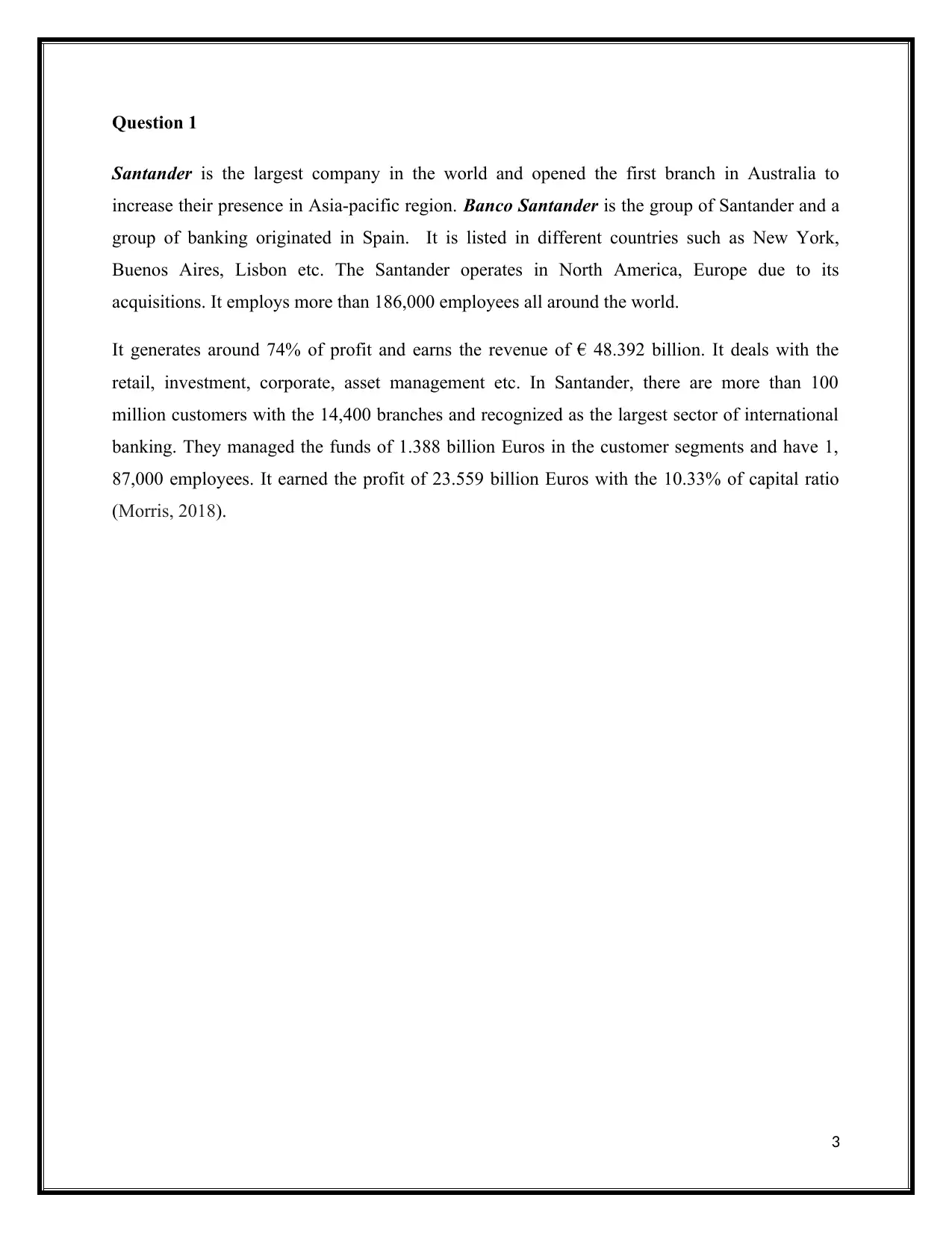
Question 1
Santander is the largest company in the world and opened the first branch in Australia to
increase their presence in Asia-pacific region. Banco Santander is the group of Santander and a
group of banking originated in Spain. It is listed in different countries such as New York,
Buenos Aires, Lisbon etc. The Santander operates in North America, Europe due to its
acquisitions. It employs more than 186,000 employees all around the world.
It generates around 74% of profit and earns the revenue of € 48.392 billion. It deals with the
retail, investment, corporate, asset management etc. In Santander, there are more than 100
million customers with the 14,400 branches and recognized as the largest sector of international
banking. They managed the funds of 1.388 billion Euros in the customer segments and have 1,
87,000 employees. It earned the profit of 23.559 billion Euros with the 10.33% of capital ratio
(Morris, 2018).
3
Santander is the largest company in the world and opened the first branch in Australia to
increase their presence in Asia-pacific region. Banco Santander is the group of Santander and a
group of banking originated in Spain. It is listed in different countries such as New York,
Buenos Aires, Lisbon etc. The Santander operates in North America, Europe due to its
acquisitions. It employs more than 186,000 employees all around the world.
It generates around 74% of profit and earns the revenue of € 48.392 billion. It deals with the
retail, investment, corporate, asset management etc. In Santander, there are more than 100
million customers with the 14,400 branches and recognized as the largest sector of international
banking. They managed the funds of 1.388 billion Euros in the customer segments and have 1,
87,000 employees. It earned the profit of 23.559 billion Euros with the 10.33% of capital ratio
(Morris, 2018).
3
⊘ This is a preview!⊘
Do you want full access?
Subscribe today to unlock all pages.

Trusted by 1+ million students worldwide
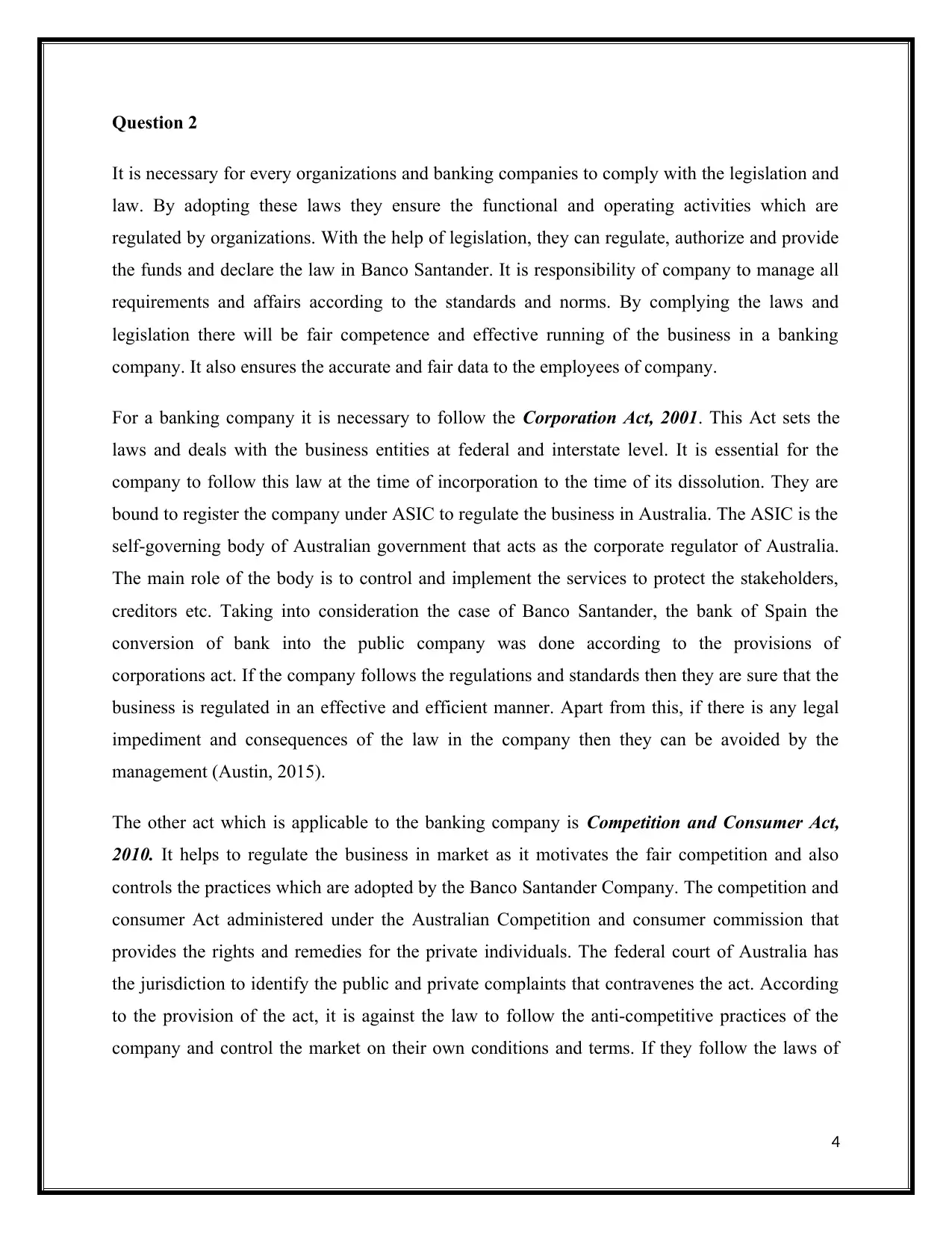
Question 2
It is necessary for every organizations and banking companies to comply with the legislation and
law. By adopting these laws they ensure the functional and operating activities which are
regulated by organizations. With the help of legislation, they can regulate, authorize and provide
the funds and declare the law in Banco Santander. It is responsibility of company to manage all
requirements and affairs according to the standards and norms. By complying the laws and
legislation there will be fair competence and effective running of the business in a banking
company. It also ensures the accurate and fair data to the employees of company.
For a banking company it is necessary to follow the Corporation Act, 2001. This Act sets the
laws and deals with the business entities at federal and interstate level. It is essential for the
company to follow this law at the time of incorporation to the time of its dissolution. They are
bound to register the company under ASIC to regulate the business in Australia. The ASIC is the
self-governing body of Australian government that acts as the corporate regulator of Australia.
The main role of the body is to control and implement the services to protect the stakeholders,
creditors etc. Taking into consideration the case of Banco Santander, the bank of Spain the
conversion of bank into the public company was done according to the provisions of
corporations act. If the company follows the regulations and standards then they are sure that the
business is regulated in an effective and efficient manner. Apart from this, if there is any legal
impediment and consequences of the law in the company then they can be avoided by the
management (Austin, 2015).
The other act which is applicable to the banking company is Competition and Consumer Act,
2010. It helps to regulate the business in market as it motivates the fair competition and also
controls the practices which are adopted by the Banco Santander Company. The competition and
consumer Act administered under the Australian Competition and consumer commission that
provides the rights and remedies for the private individuals. The federal court of Australia has
the jurisdiction to identify the public and private complaints that contravenes the act. According
to the provision of the act, it is against the law to follow the anti-competitive practices of the
company and control the market on their own conditions and terms. If they follow the laws of
4
It is necessary for every organizations and banking companies to comply with the legislation and
law. By adopting these laws they ensure the functional and operating activities which are
regulated by organizations. With the help of legislation, they can regulate, authorize and provide
the funds and declare the law in Banco Santander. It is responsibility of company to manage all
requirements and affairs according to the standards and norms. By complying the laws and
legislation there will be fair competence and effective running of the business in a banking
company. It also ensures the accurate and fair data to the employees of company.
For a banking company it is necessary to follow the Corporation Act, 2001. This Act sets the
laws and deals with the business entities at federal and interstate level. It is essential for the
company to follow this law at the time of incorporation to the time of its dissolution. They are
bound to register the company under ASIC to regulate the business in Australia. The ASIC is the
self-governing body of Australian government that acts as the corporate regulator of Australia.
The main role of the body is to control and implement the services to protect the stakeholders,
creditors etc. Taking into consideration the case of Banco Santander, the bank of Spain the
conversion of bank into the public company was done according to the provisions of
corporations act. If the company follows the regulations and standards then they are sure that the
business is regulated in an effective and efficient manner. Apart from this, if there is any legal
impediment and consequences of the law in the company then they can be avoided by the
management (Austin, 2015).
The other act which is applicable to the banking company is Competition and Consumer Act,
2010. It helps to regulate the business in market as it motivates the fair competition and also
controls the practices which are adopted by the Banco Santander Company. The competition and
consumer Act administered under the Australian Competition and consumer commission that
provides the rights and remedies for the private individuals. The federal court of Australia has
the jurisdiction to identify the public and private complaints that contravenes the act. According
to the provision of the act, it is against the law to follow the anti-competitive practices of the
company and control the market on their own conditions and terms. If they follow the laws of
4
Paraphrase This Document
Need a fresh take? Get an instant paraphrase of this document with our AI Paraphraser
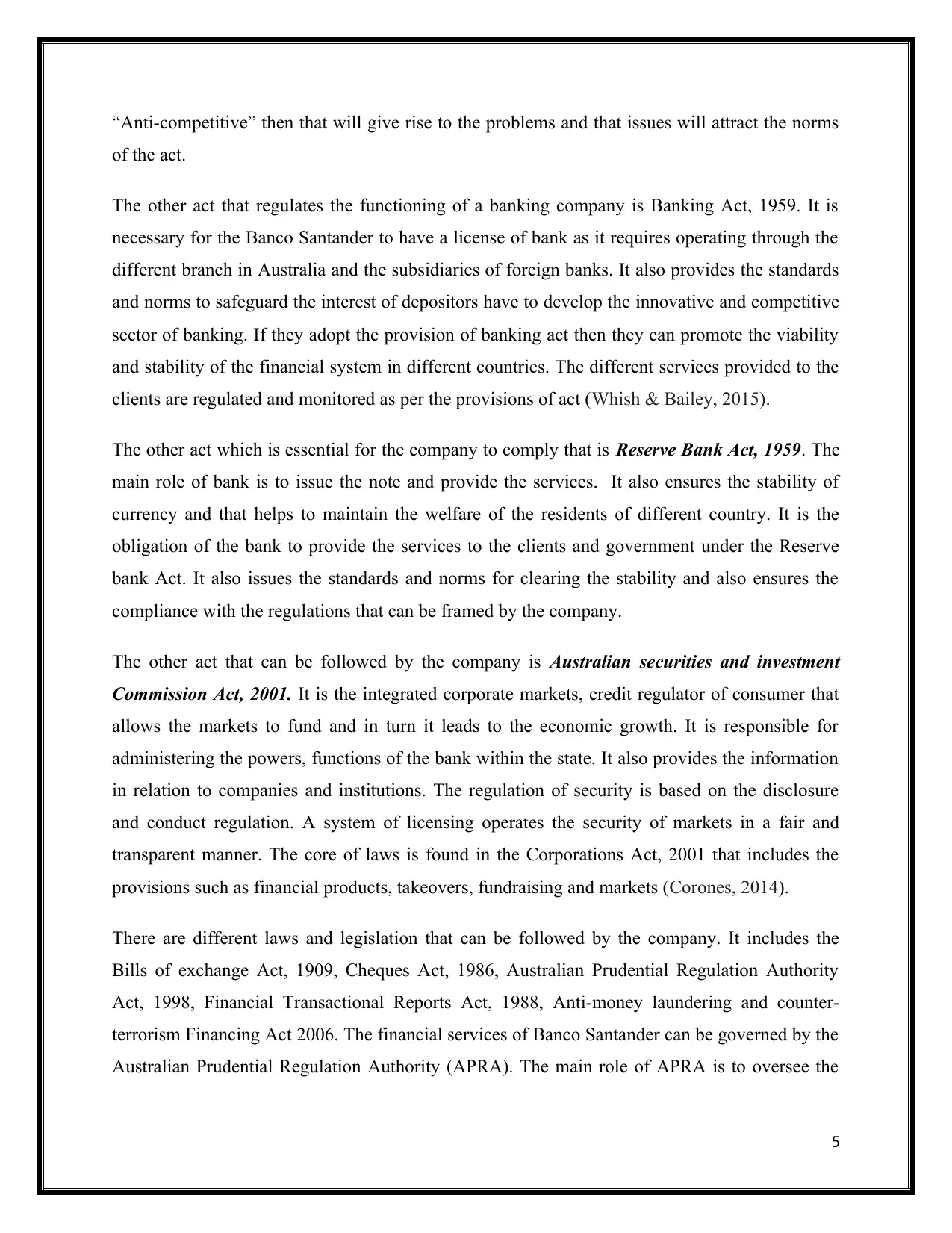
“Anti-competitive” then that will give rise to the problems and that issues will attract the norms
of the act.
The other act that regulates the functioning of a banking company is Banking Act, 1959. It is
necessary for the Banco Santander to have a license of bank as it requires operating through the
different branch in Australia and the subsidiaries of foreign banks. It also provides the standards
and norms to safeguard the interest of depositors have to develop the innovative and competitive
sector of banking. If they adopt the provision of banking act then they can promote the viability
and stability of the financial system in different countries. The different services provided to the
clients are regulated and monitored as per the provisions of act (Whish & Bailey, 2015).
The other act which is essential for the company to comply that is Reserve Bank Act, 1959. The
main role of bank is to issue the note and provide the services. It also ensures the stability of
currency and that helps to maintain the welfare of the residents of different country. It is the
obligation of the bank to provide the services to the clients and government under the Reserve
bank Act. It also issues the standards and norms for clearing the stability and also ensures the
compliance with the regulations that can be framed by the company.
The other act that can be followed by the company is Australian securities and investment
Commission Act, 2001. It is the integrated corporate markets, credit regulator of consumer that
allows the markets to fund and in turn it leads to the economic growth. It is responsible for
administering the powers, functions of the bank within the state. It also provides the information
in relation to companies and institutions. The regulation of security is based on the disclosure
and conduct regulation. A system of licensing operates the security of markets in a fair and
transparent manner. The core of laws is found in the Corporations Act, 2001 that includes the
provisions such as financial products, takeovers, fundraising and markets (Corones, 2014).
There are different laws and legislation that can be followed by the company. It includes the
Bills of exchange Act, 1909, Cheques Act, 1986, Australian Prudential Regulation Authority
Act, 1998, Financial Transactional Reports Act, 1988, Anti-money laundering and counter-
terrorism Financing Act 2006. The financial services of Banco Santander can be governed by the
Australian Prudential Regulation Authority (APRA). The main role of APRA is to oversee the
5
of the act.
The other act that regulates the functioning of a banking company is Banking Act, 1959. It is
necessary for the Banco Santander to have a license of bank as it requires operating through the
different branch in Australia and the subsidiaries of foreign banks. It also provides the standards
and norms to safeguard the interest of depositors have to develop the innovative and competitive
sector of banking. If they adopt the provision of banking act then they can promote the viability
and stability of the financial system in different countries. The different services provided to the
clients are regulated and monitored as per the provisions of act (Whish & Bailey, 2015).
The other act which is essential for the company to comply that is Reserve Bank Act, 1959. The
main role of bank is to issue the note and provide the services. It also ensures the stability of
currency and that helps to maintain the welfare of the residents of different country. It is the
obligation of the bank to provide the services to the clients and government under the Reserve
bank Act. It also issues the standards and norms for clearing the stability and also ensures the
compliance with the regulations that can be framed by the company.
The other act that can be followed by the company is Australian securities and investment
Commission Act, 2001. It is the integrated corporate markets, credit regulator of consumer that
allows the markets to fund and in turn it leads to the economic growth. It is responsible for
administering the powers, functions of the bank within the state. It also provides the information
in relation to companies and institutions. The regulation of security is based on the disclosure
and conduct regulation. A system of licensing operates the security of markets in a fair and
transparent manner. The core of laws is found in the Corporations Act, 2001 that includes the
provisions such as financial products, takeovers, fundraising and markets (Corones, 2014).
There are different laws and legislation that can be followed by the company. It includes the
Bills of exchange Act, 1909, Cheques Act, 1986, Australian Prudential Regulation Authority
Act, 1998, Financial Transactional Reports Act, 1988, Anti-money laundering and counter-
terrorism Financing Act 2006. The financial services of Banco Santander can be governed by the
Australian Prudential Regulation Authority (APRA). The main role of APRA is to oversee the
5
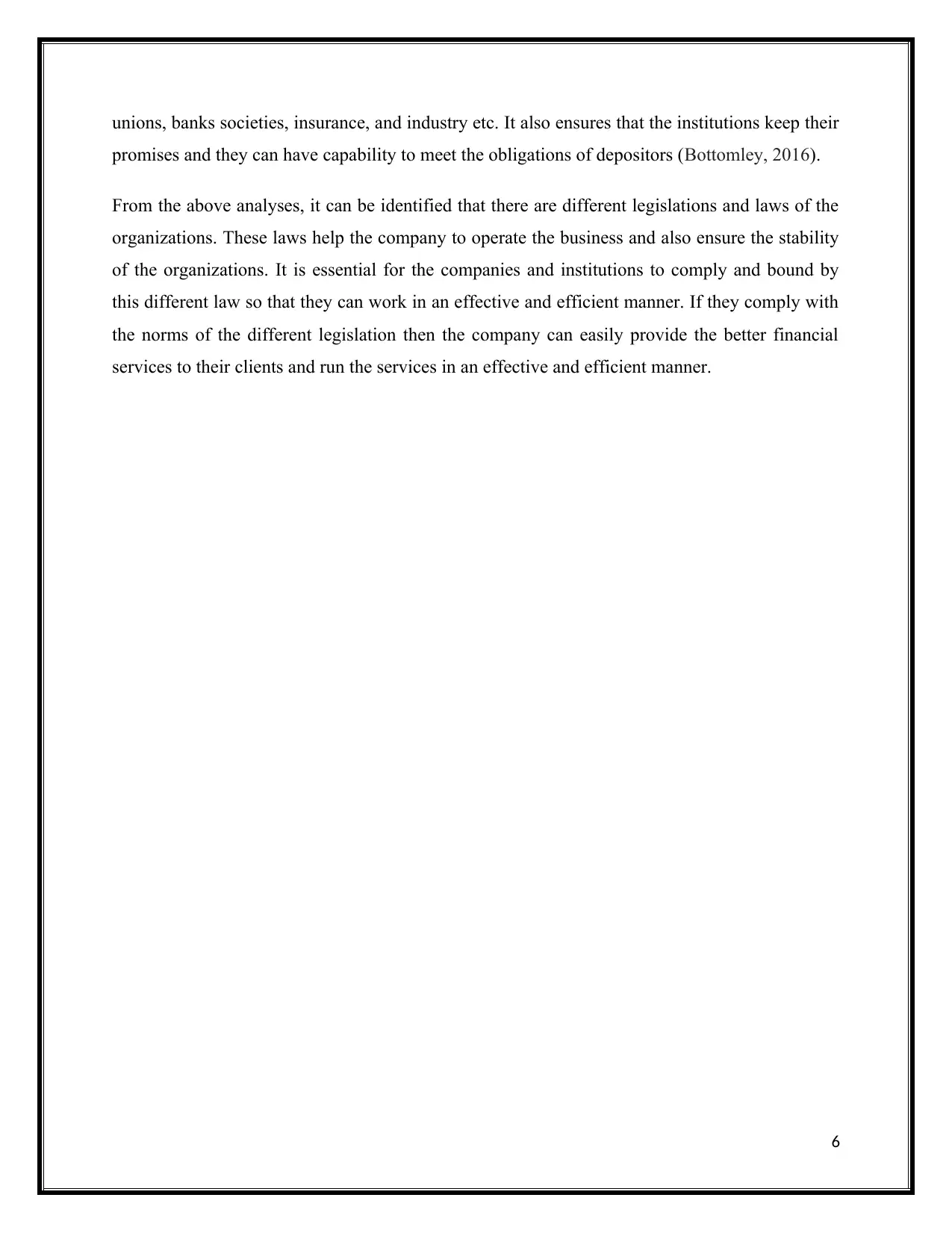
unions, banks societies, insurance, and industry etc. It also ensures that the institutions keep their
promises and they can have capability to meet the obligations of depositors (Bottomley, 2016).
From the above analyses, it can be identified that there are different legislations and laws of the
organizations. These laws help the company to operate the business and also ensure the stability
of the organizations. It is essential for the companies and institutions to comply and bound by
this different law so that they can work in an effective and efficient manner. If they comply with
the norms of the different legislation then the company can easily provide the better financial
services to their clients and run the services in an effective and efficient manner.
6
promises and they can have capability to meet the obligations of depositors (Bottomley, 2016).
From the above analyses, it can be identified that there are different legislations and laws of the
organizations. These laws help the company to operate the business and also ensure the stability
of the organizations. It is essential for the companies and institutions to comply and bound by
this different law so that they can work in an effective and efficient manner. If they comply with
the norms of the different legislation then the company can easily provide the better financial
services to their clients and run the services in an effective and efficient manner.
6
⊘ This is a preview!⊘
Do you want full access?
Subscribe today to unlock all pages.

Trusted by 1+ million students worldwide
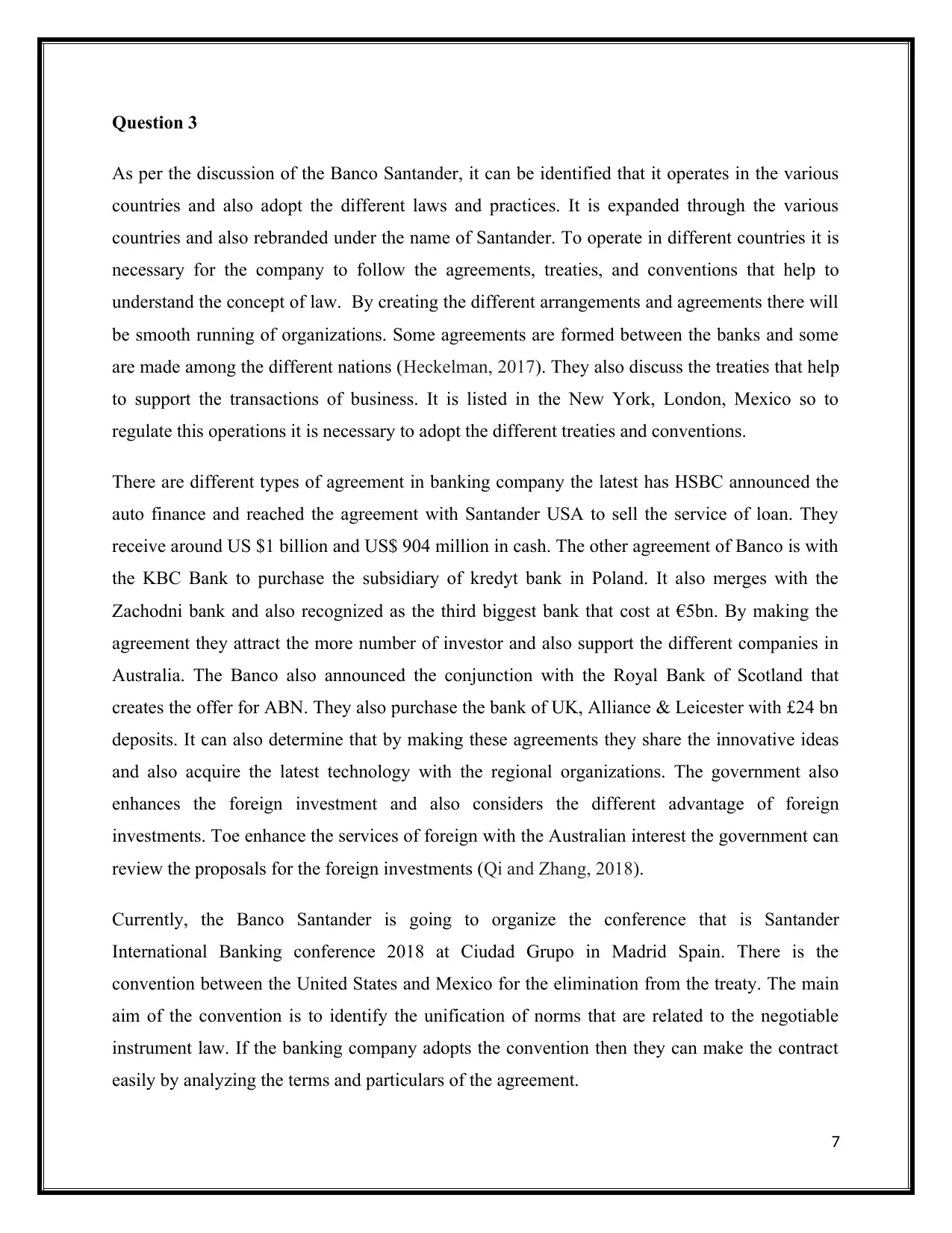
Question 3
As per the discussion of the Banco Santander, it can be identified that it operates in the various
countries and also adopt the different laws and practices. It is expanded through the various
countries and also rebranded under the name of Santander. To operate in different countries it is
necessary for the company to follow the agreements, treaties, and conventions that help to
understand the concept of law. By creating the different arrangements and agreements there will
be smooth running of organizations. Some agreements are formed between the banks and some
are made among the different nations (Heckelman, 2017). They also discuss the treaties that help
to support the transactions of business. It is listed in the New York, London, Mexico so to
regulate this operations it is necessary to adopt the different treaties and conventions.
There are different types of agreement in banking company the latest has HSBC announced the
auto finance and reached the agreement with Santander USA to sell the service of loan. They
receive around US $1 billion and US$ 904 million in cash. The other agreement of Banco is with
the KBC Bank to purchase the subsidiary of kredyt bank in Poland. It also merges with the
Zachodni bank and also recognized as the third biggest bank that cost at €5bn. By making the
agreement they attract the more number of investor and also support the different companies in
Australia. The Banco also announced the conjunction with the Royal Bank of Scotland that
creates the offer for ABN. They also purchase the bank of UK, Alliance & Leicester with £24 bn
deposits. It can also determine that by making these agreements they share the innovative ideas
and also acquire the latest technology with the regional organizations. The government also
enhances the foreign investment and also considers the different advantage of foreign
investments. Toe enhance the services of foreign with the Australian interest the government can
review the proposals for the foreign investments (Qi and Zhang, 2018).
Currently, the Banco Santander is going to organize the conference that is Santander
International Banking conference 2018 at Ciudad Grupo in Madrid Spain. There is the
convention between the United States and Mexico for the elimination from the treaty. The main
aim of the convention is to identify the unification of norms that are related to the negotiable
instrument law. If the banking company adopts the convention then they can make the contract
easily by analyzing the terms and particulars of the agreement.
7
As per the discussion of the Banco Santander, it can be identified that it operates in the various
countries and also adopt the different laws and practices. It is expanded through the various
countries and also rebranded under the name of Santander. To operate in different countries it is
necessary for the company to follow the agreements, treaties, and conventions that help to
understand the concept of law. By creating the different arrangements and agreements there will
be smooth running of organizations. Some agreements are formed between the banks and some
are made among the different nations (Heckelman, 2017). They also discuss the treaties that help
to support the transactions of business. It is listed in the New York, London, Mexico so to
regulate this operations it is necessary to adopt the different treaties and conventions.
There are different types of agreement in banking company the latest has HSBC announced the
auto finance and reached the agreement with Santander USA to sell the service of loan. They
receive around US $1 billion and US$ 904 million in cash. The other agreement of Banco is with
the KBC Bank to purchase the subsidiary of kredyt bank in Poland. It also merges with the
Zachodni bank and also recognized as the third biggest bank that cost at €5bn. By making the
agreement they attract the more number of investor and also support the different companies in
Australia. The Banco also announced the conjunction with the Royal Bank of Scotland that
creates the offer for ABN. They also purchase the bank of UK, Alliance & Leicester with £24 bn
deposits. It can also determine that by making these agreements they share the innovative ideas
and also acquire the latest technology with the regional organizations. The government also
enhances the foreign investment and also considers the different advantage of foreign
investments. Toe enhance the services of foreign with the Australian interest the government can
review the proposals for the foreign investments (Qi and Zhang, 2018).
Currently, the Banco Santander is going to organize the conference that is Santander
International Banking conference 2018 at Ciudad Grupo in Madrid Spain. There is the
convention between the United States and Mexico for the elimination from the treaty. The main
aim of the convention is to identify the unification of norms that are related to the negotiable
instrument law. If the banking company adopts the convention then they can make the contract
easily by analyzing the terms and particulars of the agreement.
7
Paraphrase This Document
Need a fresh take? Get an instant paraphrase of this document with our AI Paraphraser
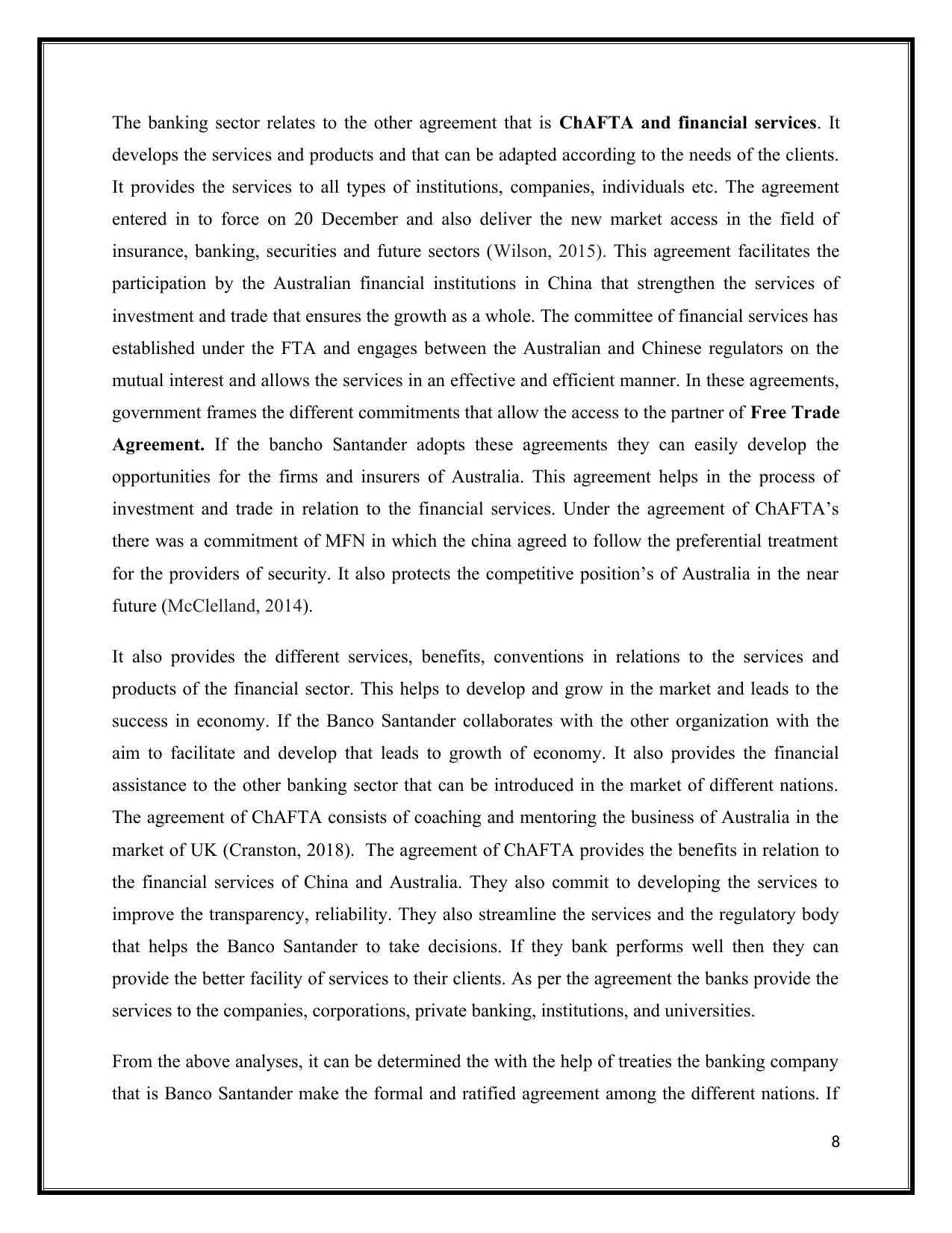
The banking sector relates to the other agreement that is ChAFTA and financial services. It
develops the services and products and that can be adapted according to the needs of the clients.
It provides the services to all types of institutions, companies, individuals etc. The agreement
entered in to force on 20 December and also deliver the new market access in the field of
insurance, banking, securities and future sectors (Wilson, 2015). This agreement facilitates the
participation by the Australian financial institutions in China that strengthen the services of
investment and trade that ensures the growth as a whole. The committee of financial services has
established under the FTA and engages between the Australian and Chinese regulators on the
mutual interest and allows the services in an effective and efficient manner. In these agreements,
government frames the different commitments that allow the access to the partner of Free Trade
Agreement. If the bancho Santander adopts these agreements they can easily develop the
opportunities for the firms and insurers of Australia. This agreement helps in the process of
investment and trade in relation to the financial services. Under the agreement of ChAFTA’s
there was a commitment of MFN in which the china agreed to follow the preferential treatment
for the providers of security. It also protects the competitive position’s of Australia in the near
future (McClelland, 2014).
It also provides the different services, benefits, conventions in relations to the services and
products of the financial sector. This helps to develop and grow in the market and leads to the
success in economy. If the Banco Santander collaborates with the other organization with the
aim to facilitate and develop that leads to growth of economy. It also provides the financial
assistance to the other banking sector that can be introduced in the market of different nations.
The agreement of ChAFTA consists of coaching and mentoring the business of Australia in the
market of UK (Cranston, 2018). The agreement of ChAFTA provides the benefits in relation to
the financial services of China and Australia. They also commit to developing the services to
improve the transparency, reliability. They also streamline the services and the regulatory body
that helps the Banco Santander to take decisions. If they bank performs well then they can
provide the better facility of services to their clients. As per the agreement the banks provide the
services to the companies, corporations, private banking, institutions, and universities.
From the above analyses, it can be determined the with the help of treaties the banking company
that is Banco Santander make the formal and ratified agreement among the different nations. If
8
develops the services and products and that can be adapted according to the needs of the clients.
It provides the services to all types of institutions, companies, individuals etc. The agreement
entered in to force on 20 December and also deliver the new market access in the field of
insurance, banking, securities and future sectors (Wilson, 2015). This agreement facilitates the
participation by the Australian financial institutions in China that strengthen the services of
investment and trade that ensures the growth as a whole. The committee of financial services has
established under the FTA and engages between the Australian and Chinese regulators on the
mutual interest and allows the services in an effective and efficient manner. In these agreements,
government frames the different commitments that allow the access to the partner of Free Trade
Agreement. If the bancho Santander adopts these agreements they can easily develop the
opportunities for the firms and insurers of Australia. This agreement helps in the process of
investment and trade in relation to the financial services. Under the agreement of ChAFTA’s
there was a commitment of MFN in which the china agreed to follow the preferential treatment
for the providers of security. It also protects the competitive position’s of Australia in the near
future (McClelland, 2014).
It also provides the different services, benefits, conventions in relations to the services and
products of the financial sector. This helps to develop and grow in the market and leads to the
success in economy. If the Banco Santander collaborates with the other organization with the
aim to facilitate and develop that leads to growth of economy. It also provides the financial
assistance to the other banking sector that can be introduced in the market of different nations.
The agreement of ChAFTA consists of coaching and mentoring the business of Australia in the
market of UK (Cranston, 2018). The agreement of ChAFTA provides the benefits in relation to
the financial services of China and Australia. They also commit to developing the services to
improve the transparency, reliability. They also streamline the services and the regulatory body
that helps the Banco Santander to take decisions. If they bank performs well then they can
provide the better facility of services to their clients. As per the agreement the banks provide the
services to the companies, corporations, private banking, institutions, and universities.
From the above analyses, it can be determined the with the help of treaties the banking company
that is Banco Santander make the formal and ratified agreement among the different nations. If
8
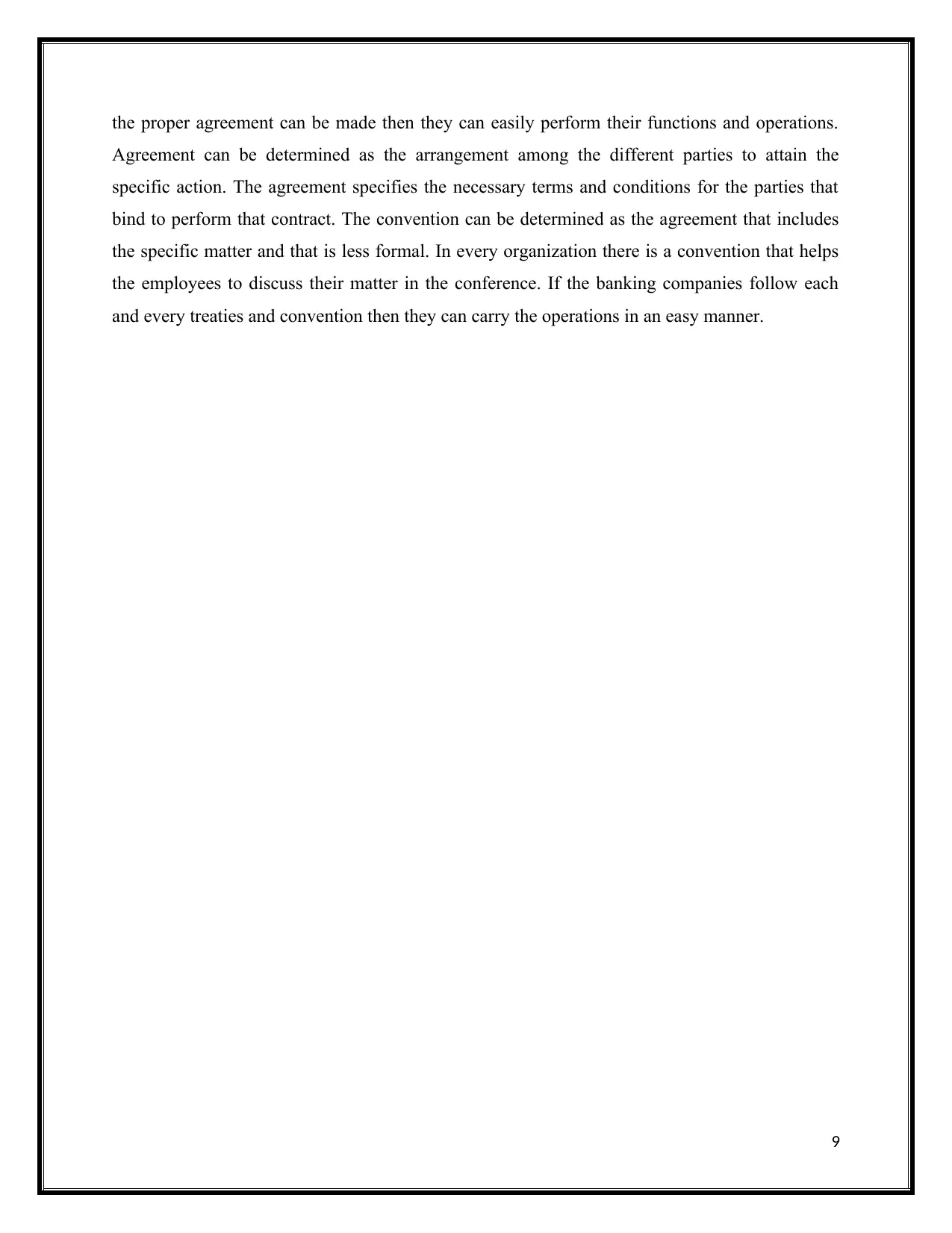
the proper agreement can be made then they can easily perform their functions and operations.
Agreement can be determined as the arrangement among the different parties to attain the
specific action. The agreement specifies the necessary terms and conditions for the parties that
bind to perform that contract. The convention can be determined as the agreement that includes
the specific matter and that is less formal. In every organization there is a convention that helps
the employees to discuss their matter in the conference. If the banking companies follow each
and every treaties and convention then they can carry the operations in an easy manner.
9
Agreement can be determined as the arrangement among the different parties to attain the
specific action. The agreement specifies the necessary terms and conditions for the parties that
bind to perform that contract. The convention can be determined as the agreement that includes
the specific matter and that is less formal. In every organization there is a convention that helps
the employees to discuss their matter in the conference. If the banking companies follow each
and every treaties and convention then they can carry the operations in an easy manner.
9
⊘ This is a preview!⊘
Do you want full access?
Subscribe today to unlock all pages.

Trusted by 1+ million students worldwide
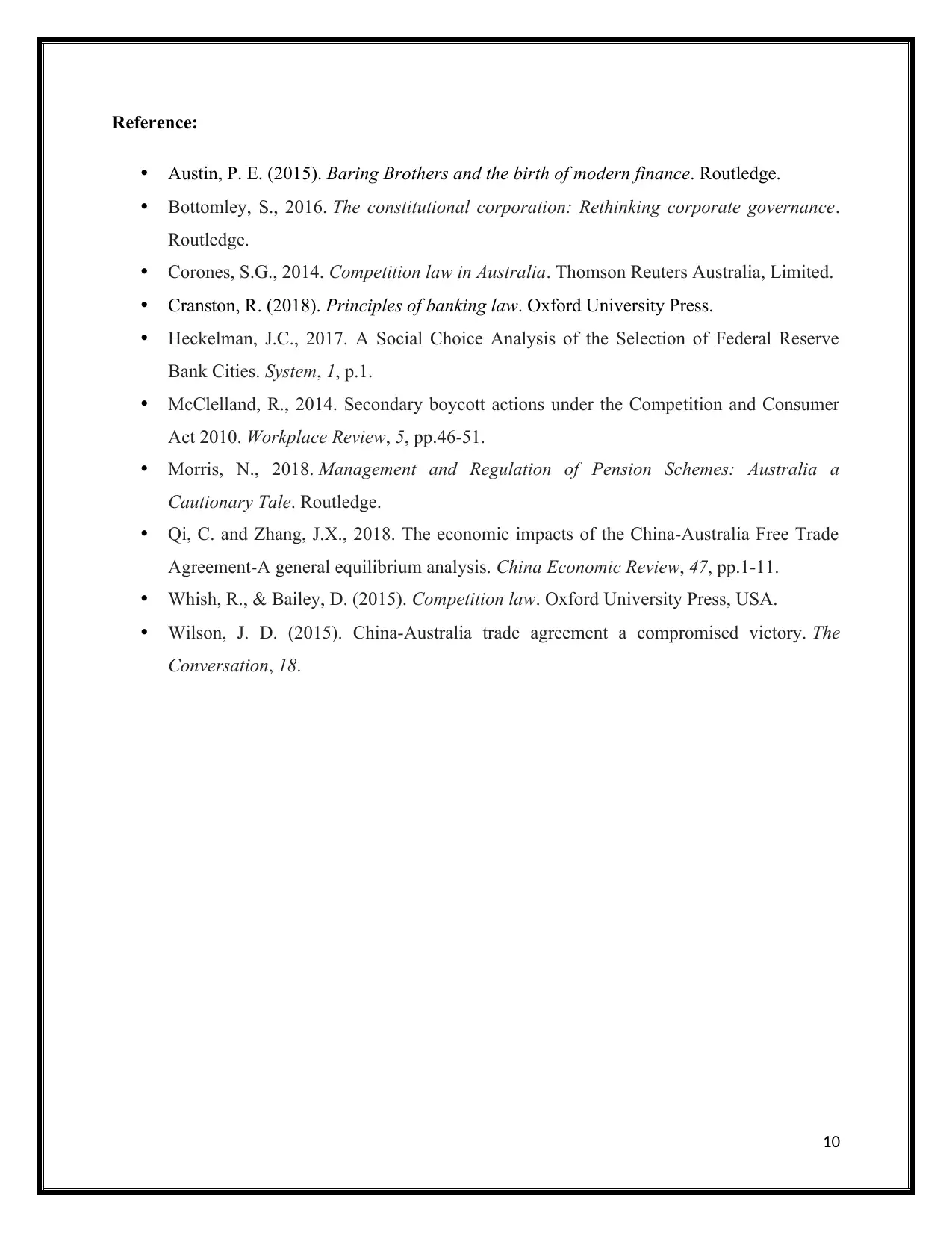
Reference:
Austin, P. E. (2015). Baring Brothers and the birth of modern finance. Routledge.
Bottomley, S., 2016. The constitutional corporation: Rethinking corporate governance.
Routledge.
Corones, S.G., 2014. Competition law in Australia. Thomson Reuters Australia, Limited.
Cranston, R. (2018). Principles of banking law. Oxford University Press.
Heckelman, J.C., 2017. A Social Choice Analysis of the Selection of Federal Reserve
Bank Cities. System, 1, p.1.
McClelland, R., 2014. Secondary boycott actions under the Competition and Consumer
Act 2010. Workplace Review, 5, pp.46-51.
Morris, N., 2018. Management and Regulation of Pension Schemes: Australia a
Cautionary Tale. Routledge.
Qi, C. and Zhang, J.X., 2018. The economic impacts of the China-Australia Free Trade
Agreement-A general equilibrium analysis. China Economic Review, 47, pp.1-11.
Whish, R., & Bailey, D. (2015). Competition law. Oxford University Press, USA.
Wilson, J. D. (2015). China-Australia trade agreement a compromised victory. The
Conversation, 18.
10
Austin, P. E. (2015). Baring Brothers and the birth of modern finance. Routledge.
Bottomley, S., 2016. The constitutional corporation: Rethinking corporate governance.
Routledge.
Corones, S.G., 2014. Competition law in Australia. Thomson Reuters Australia, Limited.
Cranston, R. (2018). Principles of banking law. Oxford University Press.
Heckelman, J.C., 2017. A Social Choice Analysis of the Selection of Federal Reserve
Bank Cities. System, 1, p.1.
McClelland, R., 2014. Secondary boycott actions under the Competition and Consumer
Act 2010. Workplace Review, 5, pp.46-51.
Morris, N., 2018. Management and Regulation of Pension Schemes: Australia a
Cautionary Tale. Routledge.
Qi, C. and Zhang, J.X., 2018. The economic impacts of the China-Australia Free Trade
Agreement-A general equilibrium analysis. China Economic Review, 47, pp.1-11.
Whish, R., & Bailey, D. (2015). Competition law. Oxford University Press, USA.
Wilson, J. D. (2015). China-Australia trade agreement a compromised victory. The
Conversation, 18.
10
1 out of 10
Related Documents
Your All-in-One AI-Powered Toolkit for Academic Success.
+13062052269
info@desklib.com
Available 24*7 on WhatsApp / Email
![[object Object]](/_next/static/media/star-bottom.7253800d.svg)
Unlock your academic potential
Copyright © 2020–2026 A2Z Services. All Rights Reserved. Developed and managed by ZUCOL.




